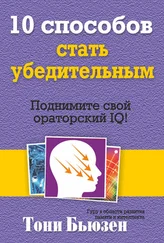As soon as he retired, McGuigan was eagerly approached by TV companies to become a specialized boxing commentator, which he did.
When he began his new career, McGuigan became very aware that his commentating style was in the order of the following: ‘ and that was a terrific left jab thrown by Jones followed by a terrific right cross … and Smith comes back with a terrific right uppercut and a terrific left jab …’. He decided to improve his Verbal Intelligence!
McGuigan literally ‘went into training’ to improve his Verbal IQ, using all the training techniques he had learned as a world-champion athlete. To aid him he used Mind Maps to help him expand his vocabulary, and his increasing knowledge of the wonder of words.
Within a short time his vocabulary and Verbal Intelligence improved dramatically. Rather than ‘terrific … terrific … terrific …’ McGuigan began to spice up his commentary with ‘lightning-like, stunning, juddering, rapier-fast, jolting, electrifying …’. Having applied the training techniques he had used to become a world-champion physical athlete, he rapidly rose up the ranks of TV sports commentators, and became a champion in the mental sphere!
McGuigan was so impressed with the rapid strides he was able to make in the development of his Verbal Intelligence that he now plays Verbal Intelligence games with his children – using Mind Maps and memory techniques to help them as Mind Maps helped him.
Your Audience
Think carefully about your audience. Their brains and Verbal Intelligences operate identically to yours.
Therefore you know that they operate on the basis of the multi-ordinate nature of words, and that their brains form gigantic networks and maps of associations, before, during and after you speak to them.
You know that they will understand and remember more at the beginnings and ends of your presentation. You know especially that they will understand and remember anything that appeals to their imagination and senses, and anything that helps them make links and associations. You know that one of the best ways to do all this is to tell stories, for stories appeal to all the elements of our memory and creativity.
You also know that you have the knowledge to help them understand and remember, link and associate. You also know that you have an increasingly rich and varied vocabulary, a voice which is unparalleled in its ability to convey information to them, and a body which, when allowed to express itself in congruence with your words, content and voice, adds enormous power to your message.
In addition to all this, your body has its five magical senses to add to the formula, which enhance, on all levels, your ability to present information and your own Verbal Intelligence.
‘How forceful are right words.’
Job 6:25
What the following Workout is focused upon is the idea that in order to be a superb presenter and to manifest your genius of Verbal Intelligence, all you have to do is to Be Yourself!
The Workout will help you on that path …
Verbal Workout
Word Puzzle Number 13
1. venet
__ __ XXX
2. dioua
__ X __ __ X
3. bidlee
__ __ __ __ XX
4. veriuq
X __ __ __ __ __
Clue: After becoming a graduate of The Power of Verbal Intelligence you will be: __ __ __ __ __ __ __ __
Verbal Intelligence Tip
Look for Prefixes, Suffixes and Roots.
Why?
You know! Let me expand further: Prefixes, Suffixes and Roots make up a large percentage of the total number of letters found in the total number of words. As a result, if you look for them when you are trying to unscramble a scrambled word, you have a higher probability of being successful in your search than if you just ‘go random’. The new word-friends you have made in Chapters 2.3 and 2.4 will be of great assistance to you here, and will help you to raise your Verbal IQ even more.
Case Study – Speak Up
There is now proof from the neuro-biological laboratories that the volume of confidence with which you speak does affect the brains of those listening. The main body of each neuron (the brain cell’s mini-brain) receives thousands of messages from the junctions (synapses), where the cell’s tentacle-like extensions come in contact with other neurons.
These message signals become progressively weaker the further they travel from brain cell to brain cell. How, then, can impulses that travel great distances possibly compete with ones from nearby?
Geoffrey McGee, at the Louisiana State University Medical Center in New Orleans, decided to investigate. He measured the strength of messages at various points along the branches of neurons. He discovered a truth that seems surprisingly obvious when you know it, and which has very significant implications and applications. The stronger the impulse (i.e. the louder the voice) at source, the stronger the signal is when it starts out, and the stronger it is further on down the line.
This means that if you wish to have what you say register in the mind of your audience, you must speak up, be clear, and trigger good and strong associations in your audience.
If you do not, your messages will be lost among the cacophony of competing and stronger sounds.
Word Puzzle Number 14
The brain and behaviour is to psychology, as mind and body are to …?
Shout It Out!
You obviously need to apply the principles behind Professor McGee’s findings whenever you are giving any sort of speech.
There is, however, a much more subtle and very important application of McGee’s research – to your own learning. When you are reviewing and revising what you have learned, especially in areas such as vocabulary and language learning, make sure you repeat things aloud . In this way you will be reinforcing your own brain with the strength of the signal you are sending to it.
If you are reviewing silently, for example in a library, don’t silently whisper, silently SHOUT! If you imagine the loud sound, the response in your brain will be the same as if you had actually heard it. In any library you can shout as loudly as you like – as long as you do it silently!
Tell Stories
Listen to story-tellers; become a storyteller! When you develop your ability to become a mesmerizing storyteller, you are well over half way on your journey to becoming a superb speaker. From now on, when you are in the presence of good storytellers, use the technique of mimicking that babies use so effectively to help you become as skilled as them.
Study in detail the elements of their own mastery, especially their vocabulary, imagination and body language.
Review your own life for ‘amazing stories’ from your own past. Choose those that are the most exciting, most ridiculous, most informative, most extraordinary, most hair-raising, most absurd and most tantalizing! Practise re-telling them to close friends, and polish them up to the level where they can be presented successfully in any situation.
In the same way, listen out for superb stories from your family and friends, and put them into your own ‘story bag’.
Learn to Project Your Voice
It is not natural for our voices to be kept in a medium range. The only reason they are is social, and can be traced back to our school days, where we were continually told to ‘be quiet’, or to social situations where it was considered impolite to raise your voice. Your voice naturally wants to experiment with its full range of volumes, especially loud! Sensibly, society has arranged certain events and activities in which it is not only permitted to raise your voice; you are actually encouraged to do so.
Читать дальше












